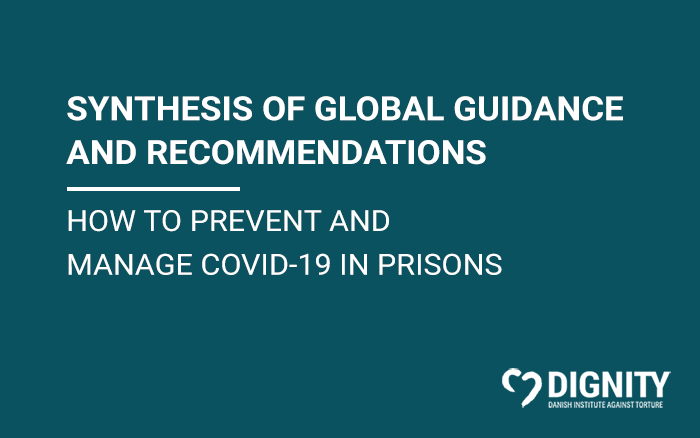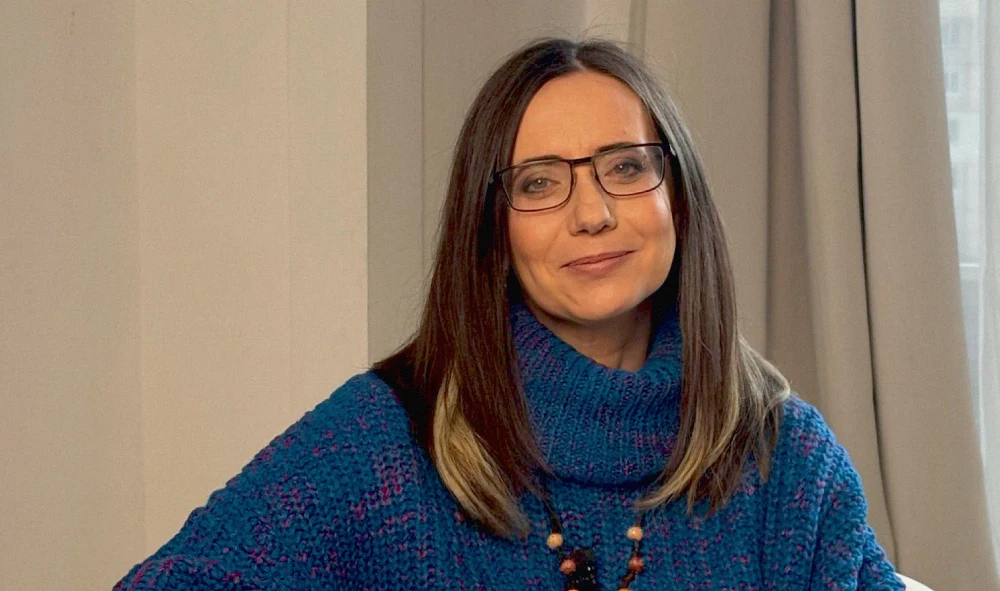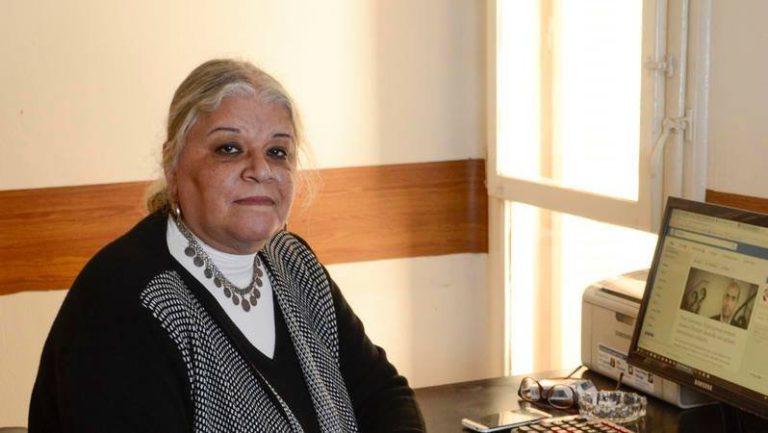(Updated: July, 16 2020)
The following is a synthesis of recommendations issued by a variety of international organizations on the prevention and control of COVID-19 in prisons. The purpose of this document is to streamline the copious amount of information generated daily on this subject in order to assist DIGNITY partners to make sense of it all, and to take quick action to prevent and control COVID-19 in their prisons and in the communities to which they are connected. Useful information sources are listed at the end of the document so partners can delve deeper into individual points should they wish.
In order to prevent and control COVID-19 in prisons, authorities should:
- Recall states’ obligations towards the preservation of detainees’ health, and especially the principles of equivalence of care and access to health care. Ensure continued access to health services during the pandemic given proportionately higher rates of certain diseases in prison such as substance use disorders, HIV/AIDS and Tuberculosis.
- Develop and publicly disclose of COVID-19 prevention and management plans, including outlining transparent decision-making processes. This should include a plan to manage the prison workforce in case of increased absenteeism due to the pandemic. It is recommended that a coordination system bringing together health and justice sectors oversees the response while ensuring the respect of human rights.
- All action further limiting detainee freedoms (e.g. medical isolation, reduced visits, etc.) should:
a. Have a legal basis
b. Be limited in scope and duration
c. Be necessary and proportionate based on the best science available
d. Not be or seem punitive
4. Prevention & containment
Preventing the virus entering into the prisons:
a. All staff and prisoners entering the prison should be screened. As part of the mandatory initial medical assessment, all new or transferred prisoners should be screened and potentially tested.
b. Reduce detained populations (supervised/conditional/early release for low-risk detainees, e.g. those scheduled for release or on pre-trial for lesser offences with priority to children and older detainees). Also consider suspending or commuting sentences and non-custodial alternatives for pre-trial detainees.
Preventing the virus spreading within the prison:
a. Adopt measures to limit detainee transfers
b. Disseminate information about COVID-19, including modes of transmission, prevention and main symptoms among staff and detainees in the appropriate languages.
c. Ensure appropriate hygiene for staff and detainees:
i. Availability and access of supplies (soap, water, disinfectant, etc.)
ii. Regular disinfection of staff and detainee locales as per WHO guidance
d. Distribute face masks free of charge to staff and detainees and communicate clear rules regarding when they are to be worn.
Managing the virus inside prisons & mitigating its effect:
a. Consider release of detainees vulnerable to COVID-19 such as those with underlying health conditions and the elderly taking into consideration the gravity of the committed crime. Provide screening of inmates prior to release.
b. Ready facilities and procedures for housing people exposed to and infected by the virus that causes COVID-19. Ensuring isolation should not result in de facto solitary confinement as defined by the UN Mandela Rules (for example, by ensuring meaningful human contact through electronic communication).
c. Treat detainees infected with COVID-19 as per national guidance in respect of the principle of equivalence of care.
d. Avail psychological support as needed to detainees and staff.
5. Consider alternative/compensation strategies for visitations without any increased cost to prisoners (e.g. video conferencing, more telephone access, etc.).
6. Ensure that detainees continue to have the right to at least one hour of daily access to open air while ensuring physical distances between individuals.
7. Ensure that released individuals have access to appropriate accommodations and health care services.
8. Where appropriate services are absent, some organizations recommend that the United Nations and other inter-governmental agencies should request access to detention centers to provide direct assistance to detainees.
9. Adopt alternative measures to ensure criminal justice can function (e.g. remote hearings) and avoid blanket measures which may be against key justice principles.
10. National Prevention Mechanisms (NPMs) can enhance their non-visit activities such as advocacy work. NPMs are advised not to halt monitoring altogether, but to adapt their approach. New detention sites such as quarantine facilities should be included in monitoring, new measures in place due to the pandemic should be assessed, and the methodology should be adapted. Some examples of adapted methodology include:
a. Remotely assess new policies enforced in prisons as a response to the pandemic;
b. Remotely collect key information such as status reports, analyze the situation and make general and prison-specific recommendations;
c. Consider prioritizing visit sites and conducting shorter visits with smaller teams while ensuring preventive measures are applied in line with the principle to do no harm. Shorter visits can focus on a smaller selection of issues based on an adapted methodology.
Read documents under publications:
The above recommendations are based on the following sources:
Penal Reform International (PRI)’s briefing note on COVID-19 and detainees: https://www.penalreform.org/resource/coronavirus-healthcare-and-human-rights-of-people-in/
Statement of principles by the European Committee for the Prevention of Torture
and Inhuman or Degrading Treatment or Punishment (CPT) on COVID-19: https://www.coe.int/en/web/cpt/-/covid-19-council-of-europe-anti-torture-committee-issues-statement-of-principles-relating-to-the-treatment-of-persons-deprived-of-their-liberty-
Observations on COVID-19 by Amnesty International: https://www.amnesty.org/download/Documents/POL3019672020ENGLISH.PDF
Statement by the Office of the UN High Commissioner for Human Rights (OHCHR) on COVID-19: https://www.ohchr.org/EN/NewsEvents/Pages/DisplayNews.aspx?NewsID=25722&LangID=E
Human Rights Watch (HRW): https://www.hrw.org/news/2020/03/19/human-rights-dimensions-covid-19-response
COVID-19 blog by Association for the Prevention of Torture (APT): https://apt.ch/en/blog/COVID-19-in-prison/
Subcommittee on Prevention of Torture and Other Cruel, Inhuman or Degrading Treatment or Punishment (SPT) advice to the UK on quarantine monitoring:
https://s3-eu-west-2.amazonaws.com/npm-prod-storage-19n0nag2nk8xk/uploads/2020/02/2020.02.25-Annexed-Advice.pdf-V2.pdf
WHO Europe Interim guidance on COVID-19 in prisons: http://www.euro.who.int/__data/assets/pdf_file/0019/434026/Preparedness-prevention-and-control-of-COVID-19-in-prisons.pdf?ua=1
Advice of the Subcommittee on Prevention of Torture to States Parties and National Preventive Mechanisms relating to the Coronavirus Pandemic:
https://www.ohchr.org/Documents/HRBodies/OPCAT/AdviceStatePartiesCoronavirusPandemic2020.pdf
International Corrections and Prisons Association (ICPA)’s Response to COVID-19 in Prisons Webinar presentation by Gary Forrest, Chief Executive, Justice Health and Forensic Mental Health Network, New South Wales, Ministry of Health, Australia, 19th March 2020:
https://icpa.org/wp-content/uploads/2020/03/ICPA-Webinar-Responding-to-Covid-19-in-Prisons.pdf
Inter-Agency Standing Committee (IASC) OHCHR and WHO, Interim Guidance, COVID-19: Focus on Persons Deprived of their Liberty, March 2020: https://interagencystandingcommittee.org/system/files/2020-03/IASC%20Interim%20Guidance%20on%20COVID-19%20-%20Focus%20on%20Persons%20Deprived%20of%20Their%20Liberty.pdf
UNODC Position Paper, COVID-19 Preparedness and Responses in Prisons, March 2020:
https://www.unodc.org/documents/Advocacy-Section/UNODC_Position_paper_COVID-19_in_prisons.pdf
Her Majesty’s Inspectorate of Prisons, Alternative approach to scrutiny during the COVID-19 pandemic, 20th April 2020: https://www.justiceinspectorates.gov.uk/hmiprisons/wp-content/uploads/sites/4/2020/03/Short-scrutiny-visit-briefing-document-for-website.pdf
UNODC, WHO, UNAIDS, OHCHR, Joint statement on COVID-19 in prisons and other closed settings, 13th May 2020: https://www.who.int/news-room/detail/13-05-2020-unodc-who-unaids-and-ohchr-joint-statement-on-covid-19-in-prisons-and-other-closed-settings
Association for the prevention of torture (APT), Office for Democratic Institutions and Human Rights (ODIHR), Guidance: Monitoring places of detention through the COVID-19 pandemic
Open Society Justice Initiative, Briefing Paper: The Right to Healthcare in Prison during the COVID-19 Pandemic, July 2020
Other useful resources:
The UN Standard Minimum Rules for the Treatment of Prisoners (Mandela Rules): https://undocs.org/A/RES/70/175
US Federal Bureau of Prisons COVID-19 page, including screening tool: https://www.bop.gov/coronavirus/index.jsp
The UK guidance to prisons regarding COVID-19: https://www.gov.uk/government/publications/covid-19-prisons-and-other-prescribed-places-of-detention-guidance
The Lancet COVID-19 page, including the latest research: https://www.thelancet.com/coronavirus
The Johns Hopkins University COVID-19 page for the public and experts: https://coronavirus.jhu.edu/
The WHO website on COVID-19, both technical guidance for institutions and online courses, and general guidance for the public: https://www.who.int/emergencies/diseases/novel-coronavirus-2019
Association for the Prevention of Torture (APT) Information Hub on COVID-19 in prisons:
https://datastudio.google.com/embed/reporting/c686bea7-3152-4dd2-b483-fce072f3ddbf/page/hpLJB
European Prison Observatory, COVID-19, What is happening in European Prisons: http://www.prisonobservatory.org/index.php?option=com_content&view=article&id=32:covid-19-what-is-happening-in-european-prisons&catid=7&Itemid=101
Norwegian National Human Rights Institution, International Resources on COVID-19 https://www.nhri.no/en/international-resources-covid-19/
Building our response on COVID-19 and detention, OMCT brief to the SOS torture network and partner organisations: https://www.omct.org/files/2020/04/25784/omct_covid19_prisonsresponse_en.pdf
Council of European, Commissioner for Human Rights, Statement, COVID-19 Pandemic: urgent steps are needed to protect the rights of prisoners in Europe: https://www.coe.int/en/web/commissioner/-/covid-19-pandemic-urgent-steps-are-needed-to-protect-the-rights-of-prisoners-in-europe
Justice Project Pakistan, COVID-19: Infected prisoners and deaths across the world, live global map: https://www.jpp.org.pk/covid19-prisoners/





